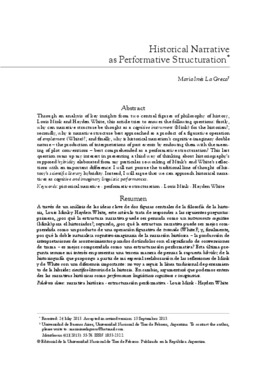Historical narrative as performative structuration

Ver/
Fecha
2013-10Autor
La Greca, María InésResumen
Through an analysis of key insights from two central figures of philosophy of history, Louis Mink and Hayden White, this article tries to answer the following questions: firstly, why can narrative structure be thought as a cognitive instrument (Mink) for the historian?; secondly, why is narrative structure best approached as a product of a figurative operation of emplotment (White)?; and finally, why is historical narration’s cognitive-imaginary double nature – the production of interpretations of past events by endowing them with the meaning of plot conventions – best comprehended as a performative structuration? This last question sums up my interest in presenting a third way of thinking about historiography’s supposed hybridity elaborated from my particular re-working of Mink’s and White’s reflections with an important difference: I will not pursue the traditional line of thought of history’s scientific-literary hybridity. Instead, I will argue that we can approach historical narratives as cognitive and imaginary linguistic performances. A través de un análisis de las ideas clave de dos figuras centrales de la filosofía de la historia, Louis Mink y Hayden White, este artículo trata de responder a las siguientes preguntas: primero, ¿por qué la estructura narrativa puede ser pensada como un instrumento cognitivo (Mink) para el historiador?; segundo, ¿por qué la estructura narrativa puede ser mejor comprendida como un producto de una operación figurativa de tramado (White)?; y, finalmente, por qué la doble naturaleza cognitivo-imaginaria de la narración histórica – la producción de interpretaciones de acontecimientos pasados dotándolos con el significado de convenciones de trama – es mejor comprendida como una estructuración performativa? Esta última pregunta resume mi interés en presentar una tercera manera de pensar la supuesta hibridez de la historiografía que propongo a partir de mi especial reelaboración de las reflexiones de Mink y de White con una diferencia importante: no voy a seguir la línea tradicional de pensamiento de la hibridez científico-literaria de la historia. En cambio, argumentaré que podemos entender las narrativas históricas como performances lingüísticas cognitivas e imaginarias.
